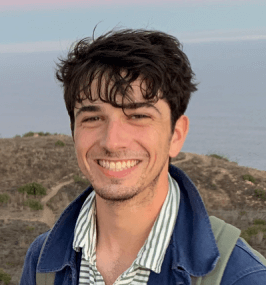‘The first thing I did was kiss the ground:’ Readers write about their first trips to Israel
Memories of archaeological digs, a sense of Jewish connection and both optimism and fear in the Jewish state
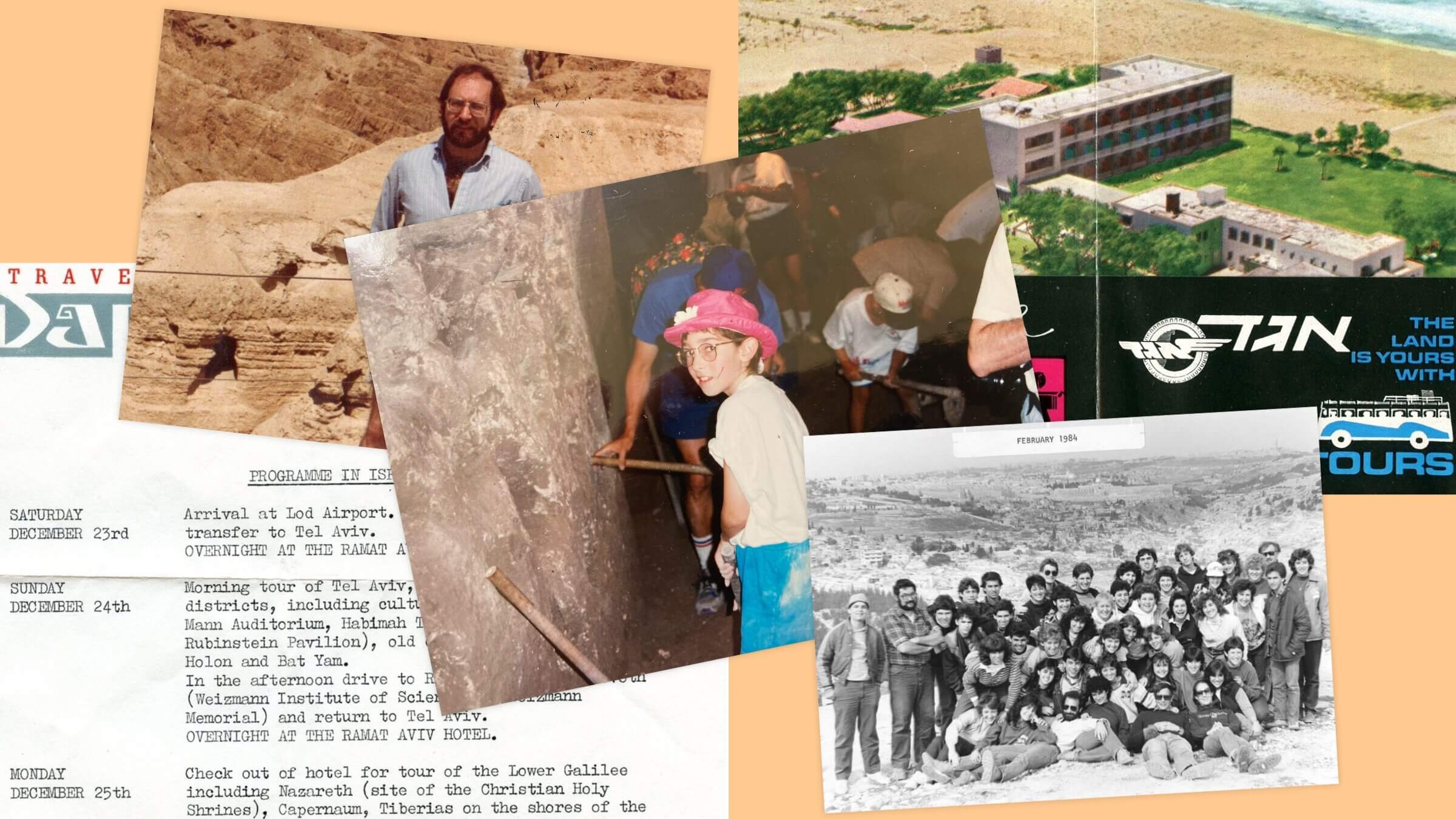
Readers sent in their memories and photographs of their first trips to Israel. Photo-illustration by Matthew Litman. Photos courtesy of Van Wallach, Natalie Baff, Ilana Goldberg Block and Brian Saide
Natalie Baff prayed at the Western Wall and the Dome of the Rock during her first trip to Israel.
While staying at Kibbutz Sde Boker, Hallie Segal shook David Ben-Gurion’s hand.
When Van Wallach visited Israel for the first time in 1982, he wrote about it for the Forward.
To mark Israel’s 75th anniversary, Forward readers submitted memories and photographs of their first trips to Israel. They recalled the excitement of exploring a new place, moving interactions with locals and feeling an immediate sense of belonging.
And they also remembered the difficulty of encountering Israel in times of war, or leaving an idyllic trip only to return home to news of new conflict.
In its 75 years, Israel has meant many things to many people. These stories help illustrate that breadth. They have been edited for length and clarity.
‘I couldn’t have ever imagined something like this’
I was 16, in 1951. I stayed with my Onkel Paul and Tante Frieda, my mother’s older sister. They had bought a small apartment on HaYarkon Street, across from a deserted stretch of beach, long before all the big hotel developments. I spent three delightful summer months in my cousin Esther’s bedroom while she was serving in the army.
I befriended three girls my age. They took me to the parks, tennis courts and beach, and I marveled at their mastery of English. One of the girls, Karin, has remained a friend. We keep in touch, though she reproaches me for not having come back to Israel since 1971. She’s right, a visit is long overdue. But I’m sure I wouldn’t recognize it now.
—Éliane Orléans Gerstein
It was 1994, I was 9 years old, and we were on a very American tour. I remember at an archaeological dig at Beit Guvrin-Maresha National Park, feeling that I, a child, was honored with participating in something very important. I had been charged with excavating literal pieces of our history.
—Ilana Goldberg Block
It was 1962, and I went to Israel on a teen tour of Europe. It was a fledgling country trying to catch up. The streets were narrow, most of the cars were old. We traveled the country and saw the start of the building of Be’er-Sheva, where we stayed at a new motel with a pool and air conditioning. There was a feeling of enthusiasm wherever we went, that this new country had a future — probably not an easy one, but one that its people were willing to attempt.
—Joy Pollock
I went on a USY Israel Pilgrimage when I was 16, during the summer of 1975. While we were staying in downtown Jerusalem, a bomb exploded on the street right in front of our hotel. We were not in the hotel at the moment of the explosion, thank goodness. My room was on the second floor, and our balcony was blown to bits, along with the clothes we had washed and set out to dry.
Growing up in a fairly protected community in Morristown, New Jersey, I couldn’t have ever imagined something like this. I remember standing in line for hours at the post office to make a collect call to my parents to let them know I was safe.
—Julie Stone
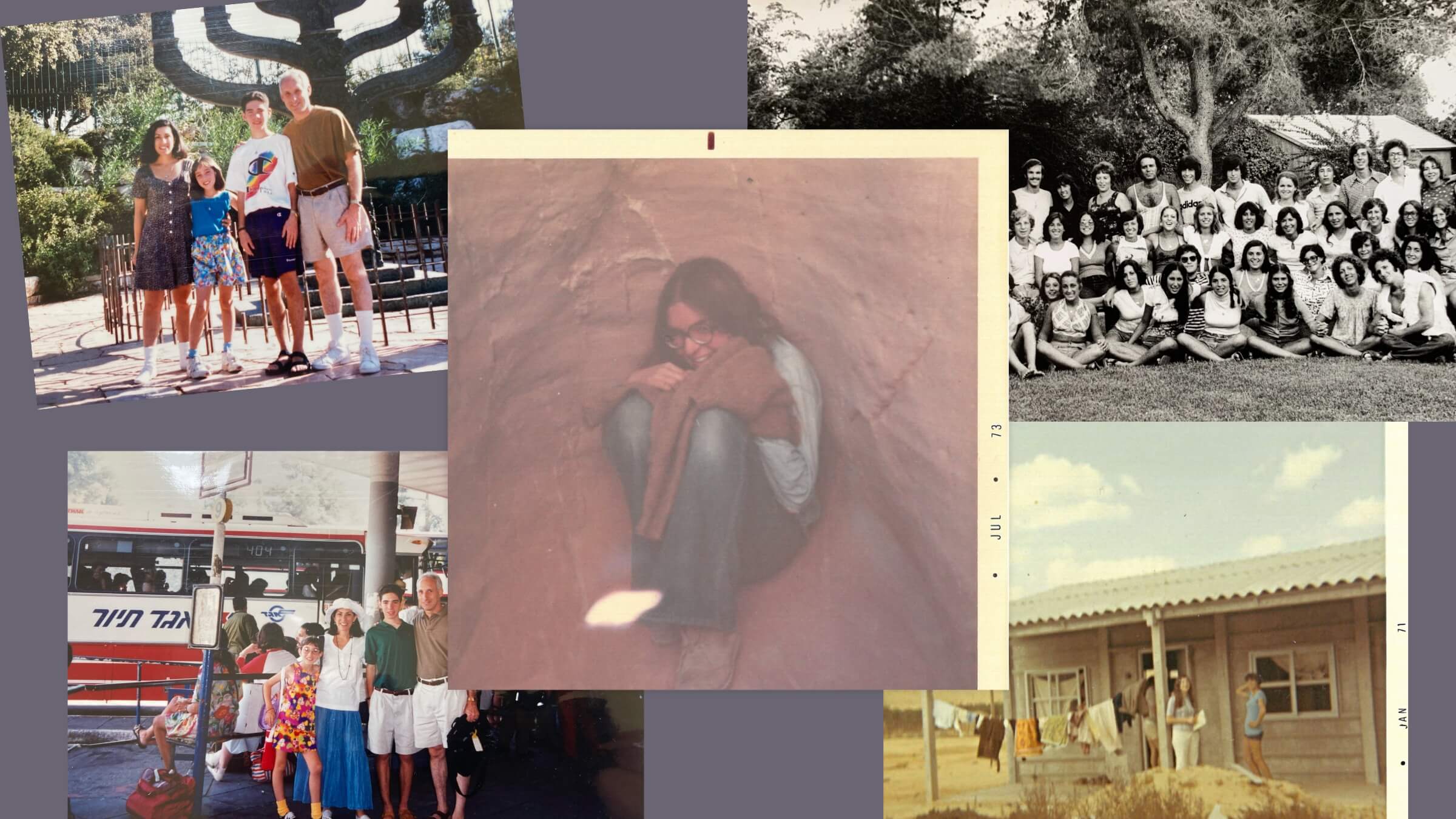
I had never been on an airplane when I set off in 1970 for six months in Israel as an exchange student. I was 16 years old.
I was in shock for the first few months — coming from the antiwar movement in the U.S., to spending two weeks at Kibbutz Sde Boker doing army training. I was the sole American. They handed me an Uzi. I made some speech about how we must pursue peace. I twisted my ankle the first day of training. Ben Gurion was still alive and lived at Sde Boker. I shook his hand.
I befriended Irit, a girl in my class. She was a serious student, a talented pianist and intellectual in a very European way. I remember sitting in her family’s tiny kitchen in Ramat Gan. Irit’s father was making shpeck. Her mother was plying me with tea and cake. They reminisced about their pre-war leftwing affiliations. Her mother lived in Germany until 1936. Her father was in Hungary until the deportations of 1944.
“Our experiences in Europe should serve as a warning to you,” her mother said. “The Left did not care about Jews. Israel is the only alternative and hope for Jews in today’s world.”
When I returned in 1974, the first thing she asked me was, “So, are you still a leftist?”
—Hallie Segal
‘It was normal to be Jewish’
It was 1998. My wife and I met my two brothers and their spouses for several weeks in Israel. We did the usual: museums, Masada, a visit to a kibbutz, Haifa. But the highlight was Jerusalem, where our mother, Sarah, and her siblings were born.
After much research we found the home they lived in before immigrating to America in 1922. Before they left that home, they took a grand family photo. Our mother and her father were not present; they were already in America. A space was left and the photographer later “burned in” their photos. Photoshop in 1922!
—Marvin Citron
My first visit to Israel was in 1970. I arrived on a boat from Venice, and the first thing I did was kiss the ground.
As I traveled around Israel, I felt freed of this weight of antisemitism that I had not even been aware of. Suddenly, I was in a country where it was normal to be Jewish. I thought about making aliyah, but didn’t. Too hard, I thought, too difficult. Had I immigrated, I would have been part of today’s protests against Netanyahu’s creeping fascism.
—Priscilla Alexander
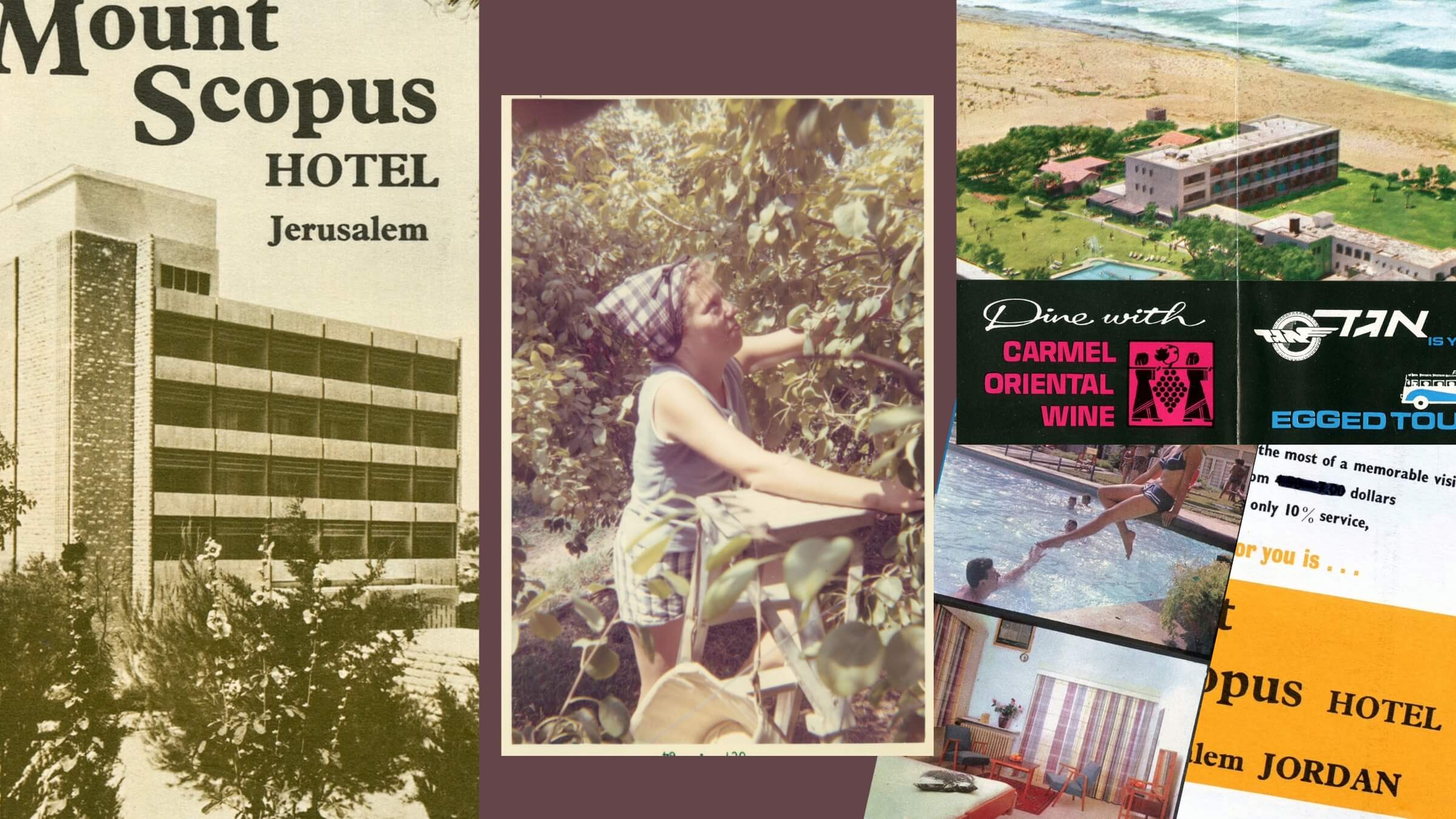
My first trip to Israel was December 1967, on a 10-day tour. In Nablus, our bus broke down and our guide and driver left to get help.
I wandered the narrow lanes and passageways, at first accompanied by others from my tour. Some Arabs joined us, and the Americans went back to our bus. I bought items at the outdoor shacks, where the owners were friendly and helpful. Two Arabs showed me the way to the post-office. I felt completely safe — and I was.
In Jerusalem, we visited the Wailing Wall, where men and women prayed together, without separation. We visited Dome of the Rock, took our shoes off, and prayed. Everything was peaceful and so hopeful.
—Natalie Baff
July 1964. I was on a Jewish Agency program. When we first arrived we stayed at a former youth aliyah site in a divided Jerusalem. After the orientation, we went to Kibbutz Yizre’el in the Jezreel Valley. Some of us, including me, harvested pears.
Israel was generally optimistic then. I had grown up in a small town in which Jews were a small minority. In Israel, almost everyone was Jewish. There was nothing that I needed to do to affirm that. Didn’t need to attend synagogue services or belong to Hillel. Just be. A liberating concept.
—Helen Blumenthal
‘Optimism, naivety and ignorance’
I was born in Tel Aviv in 1946, but my parents left 8 months later, expecting to return after tensions and conflicts died down — which never happened.
So, my real first trip was when I was 20, when I was studying at the Hebrew University. I was there during the 1967 Six Day War, and was in the first group of civilians to reach the Western Wall after the war. The optimism, naivety and ignorance I had about Israel back then are not the same, but that war and the walk to the Kotel remain imprinted in my heart and mind.
—Ami Saperstein Zusman
My first trip to Israel was in 2006. For the two weeks we had an extraordinary tour of the country, all through Tel Aviv and Jerusalem, all the way to the Lebanese border. We stayed another week to visit my wife’s relatives. I said to myself, I can see why people travel here, and why many move here.
We left Israel that third week and arrived in New York. On the monitors at the gate, we saw the news that the Israeli military had crossed into Lebanon. I guess we were lucky with our timing.
—Morris Weinner
I first visited Israel in June 1982, when I didn’t know an alef from a bet. My girlfriend urged me to go, so I joined a tour that arrived at the start of the First Lebanon War.
My photos from Masada, Yad Vashem, Hebron and the Western Wall mix with pictures of IDF trucks on the move, troops mustering and tank emplacements near the Lebanon border. The experience strengthened my engagement with Judaism. And as a reporter, I knew a good story when I lived one.
On Nov. 14, 1982, the Yiddish Forward’s English section ran my account: “My First Time — Visit to Israel.”
—Van Wallach
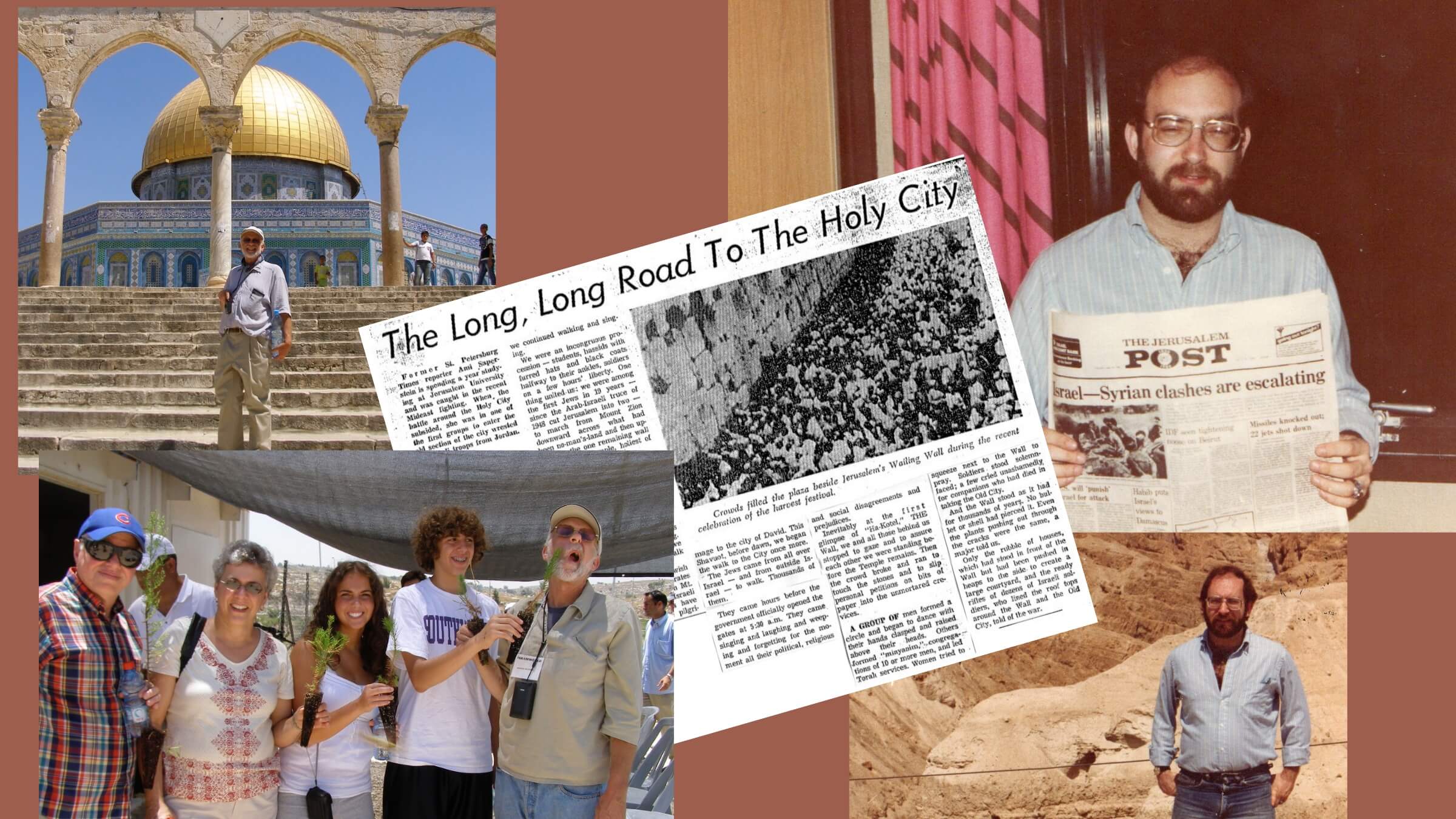
My first trip to Israel was in August 1971. I graduated from NYU that January, and that summer went to Athens with my friend Judy and her Greek boyfriend, Dmitri. One day, lying in the sun at a beach, Dimitri said “Look, there go your planes overhead.” I asked him what he meant. He explained those planes were the Israeli air force, and they belonged to me since I was Jewish.
It made such an impression that I called TWA and took a trip to Israel from Greece for a few days. I don’t know what possessed me to do such a thing. I didn’t know a soul in Israel, and I went alone. I called my parents and told them I was in Israel. They were so happy. All they ever wanted for me was to connect to Israel, and all I wanted to do was go to Puerto Rico and Greece.
I returned to New York with a plan to make aliyah. I schlepped out to Pelham Parkway to learn Hebrew. The first word we learned was “kesher” — connection.
—Terri Granot
Do you have a story and photo to add? Send it to [email protected], subject line: First Trip to Israel.



